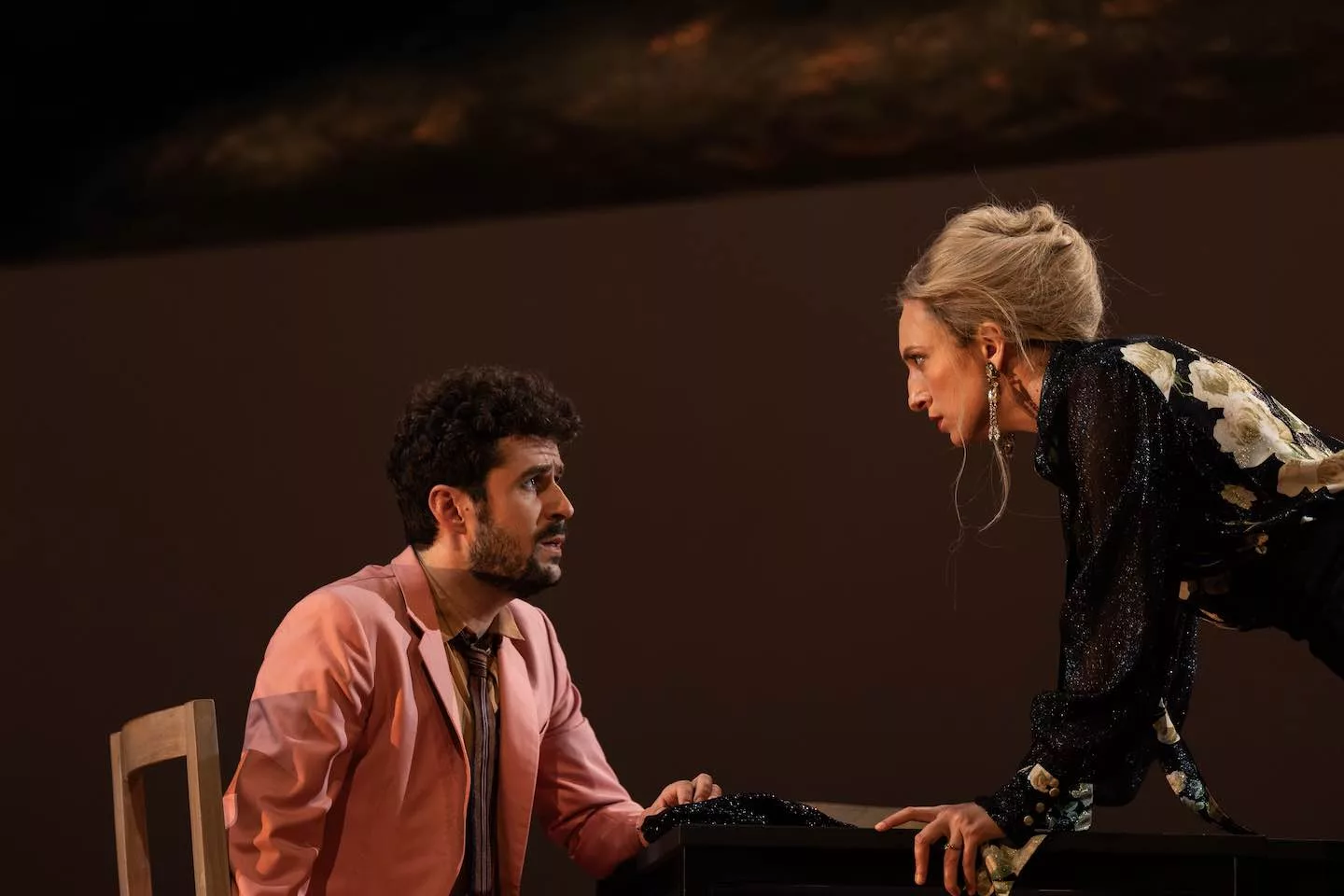
Crédit : Laurent Guizard
The Coronation of Poppea or Love Triumphant at the Opéra de Rennes
02/10/2023 - Olyrix - Emmanuel Deroeux
The Opéra de Rennes launches its operatic season with The Coronation of Poppea (Monteverdi) performed by Damien Guillon’s Le Banquet Céleste, directed by Ted Huffman, highlighting the (en)play of power and sensuality, the better to make Love triumph (over Virtue):
“What happens when our moral values are discarded? What can we do when we watch helplessly as a certain world order collapses? This is the question that director Ted Huffman asks himself in the programme, a question posed in “The Coronation of Poppea” by Nero, whose love takes precedence over virtue (he repudiates Octavia), a question that of course still resonates with our society.
The staging confronts the spectator with these questions, which are all the more visible in this bare stage, with no backstage to hide plots or allow the characters/performers to take refuge. In the sets designed by Johannes Schütz and adapted by Anna Wörl, only a large white alcove occupies the back of the stage, an illusory shelter for the protagonists who become spectators of the suffering that awaits them. In the courtyard of this totalitarian Rome, everything is out in the open, there is no privacy. The characters themselves move a few pieces of accessory furniture, and it is above all Bertrand Couderc’s contrasting lighting that defines the sudden changes of scene. Overlooking the stage, a huge rusty tube painted black and white seems to symbolise good and evil, a tired, crushing Manichaeism. Astrid Klein’s modern-day costumes highlight the shapes of the bodies, including the (very) skimpy outfits.
The vocal line-up is renewed for these performances in Rennes (after Aix and Versailles), offering several young artists the opportunity to take on new roles. The ambitious and seductive Poppea is played by Catherine Trottmann, who brings her piquant acting and slightly dark timbre to the role (unfortunately losing her accuracy in her high notes).
Countertenor Ray Chenez fully assumes the role of Nero, playing it as a seductive, self-important young leading man. His brilliant timbre, particularly at the top of the range, is powerful and vigorous, as well as sensual and capricious. Some of the midrange and especially the bass lack body, however.
Victoire Bunel lends her voice to the noble and proud Octavia, as well as to Virtue in the Prologue. Her warm, caressing voice fully serves the incarnation of a woman wounded and humiliated, but proud and touching in her anger. Her lamentations are filled with long, heavy silences full of heart-rending sorrow.
Othon is sung by countertenor Paul-Antoine Bénos-Djian, who brings the sensitivity of his soft, mellow timbre to the role, serving up a speech that is always very natural. Adrien Mathonat as Seneca impresses with his deep voice, very present and full of authority. His death is a powerful moment, both in the song that precedes it and afterwards: the performer plays the dead man in a way that is all the more disturbing when Nero, in his unhealthy cruelty, makes the deceased drink wine and articulates his arms like a puppet.
Paul Figuier gave a hilarious performance as the tall, blonde nanny Arnalta, who seconded Poppea, and as Octavia’s serious, bespectacled, brunette nanny (he actually changed his clothes on stage, adding to the comedy of cross-dressing and the playfulness of the theatre). His timbre is nonetheless round and tender, almost maternal, with particular attention to diction.
Maïlys de Villoutreys offers a fine voice to Fortune and Drusilla, agile and clear. Camille Poul plays Love and a valet with commitment and dynamism, in a luminous voice with a full timbre.
Thibault Givaja’s diction as Libertus and a soldier is attentive and clear, while Yannis François’s few interventions as the Licitor and a familiar face of Seneca bring out a warm voice. The poet Lucain is interpreted with vocal agility by Sebastian Monti, who also plays a soldier and an acquaintance of Seneca.
Under Damien Guillon’s sensitive and attentive direction, the musicians of the Banquet Céleste bring these lively, rhythmic accompaniments to life. Their attention to the singers is extremely precise and constant.
The audience applauded and gave a long round of applause to all the artists, expressing their delight at having heard such talented young singers and Le Banquet Céleste, the ensemble in residence which is celebrating its fifteenth anniversary this season.